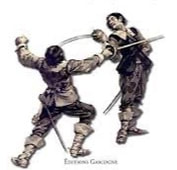|
Edouard Forestié published one of Gouges’s first biographies, printed in her natal Montauban in 1901. He portrays her as a true ‘Cadette de Gasconne’ full of heart and enthusiasm, rather than an intelligent woman with a feminist agenda as Lacour had in a piece published just before Forestié’s book. A 'Cadet de Gascogne' was a usually poor but courageous soldier from the South West of France. Famous 'Cadets' are D'Artagnan and Cyrano de Bergerac. In his appendix, Forestié includes two letters written by Olympe’s grandson, Jean Hélie Hippolyte Aubry de Gouges 1798-1870. Born five years after his grandmother’s death, he spent his childhood in French Guyana, but came back to France where he worked as a cabinet maker. Forestié notes that his spelling is unorthodox, and puts it down to a foreign education. This could be a reference to the fact that metropolitan France started to reform and unify spelling in the nineteenth century – or it could be a polite way of saying that Aubry de Gouges didn’t have much of an education at all. The second letter, which is in answer to a query by Forestié’s father about his famous grandmother gives us some insight into what sort of standing she had with her family. What struck me is how it was her abolitionist work, rather than her feminist or other political writings that Aubry de Gouges found particularly objectionable. I paraphrase parts of the letter below: She was a stubborn woman, he says, who was the cause of her son (his father’s) unhappiness. In particular he blames her writings on slavery, claiming that his father should have burnt them rather than presented them to Bonaparte. No-one, he says, knew the secrets of the lives of Black people better than her: they were her obsession, and she did everything for them. Her 'political furies' led her to the scaffold and ruined her son's carreer. Aubry de Gouges offered to send more details of his grandmother’s life in his next letter. Unfortunately, he did shortly afterwards and this was his last letter.
The text of the letters is available here. Many thanks to Andrew Groom who came across the letters during his own genealogical research and shared them with me.
0 Comments
|
About
This is where I live blog about my new book project, an intellectual biography of three French Revolutionary women philosophers. Categories
All
Archives
November 2022
|

 RSS Feed
RSS Feed